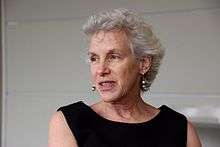Joan C. Williams
Joan C. Williams (born 1952) is an American feminist legal scholar whose work focuses on issues faced by women in the workplace. She currently serves as the Founding Director at the Center for WorkLife Law. Williams is also a Distinguished Professor of Law at the University of California, Hastings School Law.[1] Williams also contributes to the Harvard Business Review blog, the Huffington Post, and the Psychology Today blog.
Joan C. Williams | |
|---|---|
 | |
| Born | 1952 (age 67–68) |
| Occupation | Distinguished Professor, UC Hastings College of the Law |
| Title | Founding Director, the Center for WorkLife Law |
| Academic background | |
| Education | B.A. from Yale University; M.A. from MIT; J.D. from Harvard Law School |
| Website | http://www.worklifelaw.org |
Education
Williams received a B.A. in history from Yale, a master's degree in City Planning from the Massachusetts Institute of Technology, and a J.D. from Harvard Law School.[2]
Women in the workplace
The primary focus of Williams's work has been gender inequality in the workplace and the lack of women in leadership positions. She looks at how gender roles and expectations influence career success of both women and men. Her main arguments focus on the need for both men and women's roles to be redefined in order to allow for greater gender equality in the workforce.
In Unbending Gender: Why Family and Work Conflict and What To Do About It,[3] winner of the 2000 Gustavus Myers Outstanding Book Award, she argues that in order for there to be equal opportunity for men and women in the workplace, not only must women be freed from their traditionally exclusive responsibility for child-rearing, housekeeping, and other domestic duties; but that men need to be freed from the burden of their traditionally exclusive role as breadwinner.[4]
In her latest book What Works for Women at Work: Four Patterns Working Women Need to Know,[5] co-authored with her daughter Rachel Dempsey, she identifies four particular obstacles that women face:[6]
- The pressure for women to constantly prove their competence at work.
- The need for women to find the right balance between masculinity and femininity in the workplace.
- The long-discussed issue of mothers balancing responsibilities at home and work.
- The idea that women's strategies for solving these issues vary and they often feel compelled to argue for their way and against the ways of other women.
Center for Work Life Law
The Center for Work Life Law was founded by Williams with the goal of creating new initiatives that would help women to succeed in the workplace, which she identified as having stalled, as women's involvement in the workplace hit a plateau in the 1990s. The Center aims to create concrete and permanent solutions to many of the problems faced by women.
Much of the work done attempts to marry research with policy in order to change attitudes towards working women, creating new methods for women to become leaders, and also integrates and acknowledges that gender attitudes need to change for men, as well. To date, Williams and her colleagues have succeeded in formulating new best practices, legal theories, policies, and even a framework for performance evaluations that integrates research on gender issues in the workplace.[7]
The Center for Work Life Law also has a series of initiatives and workshops aimed at providing women with skills and support in order to become leaders in their workplaces and also provides companies and organizations with information and training on how to create an environment that allows for women to advance. Additionally, their Gender Bias Learning Project works with universities to retain women in STEM programs.[8]
Selected Works
- Williams, Joan C. (2017). White Working Class: Overcoming Class Cluelessness in America. Boston, MA: Harvard Business Review Press. ISBN 978-1633693784.
- Williams, Joan C.; Dempsey, Rachel (2014). What Works for Women at Work: Four Patterns Working Women Need to Know. New York, NY: NYU Press. ISBN 978-1479835454.
- Williams, Joan C. (2010). Reshaping the Work-Family Debate: Why Men and Class Matter. Cambridge, MA: Harvard University Press. ISBN 978-0674055674.
- Williams, Joan C. (1999). Unbending Gender: Why Family and Work Conflict and What To Do About It. Oxford: Oxford University Press. ISBN 978-0195094640.
See also
References
- "Joan C. Williams | Psychology Today". psychologytoday.com. Retrieved 2014-05-12.
- "Joan C. Williams, Distinguished Professor of Law, UC Hastings Foundation Chair and Director of the Center for WorkLife Law - UCHastings". uchastings.edu. Archived from the original on 2015-09-10. Retrieved 2014-05-12.
- Williams, Joan C (2000). Unbending gender: why family and work conflict and what to do about it. Oxford New York: Oxford University Press. ISBN 9780195147148.
- "The Feministing Five: Joan C. Williams". feministing.com. Retrieved 2014-05-12.
- Williams, Joan C; Dempsey, Rachel (2014). What works for women at work: four patterns working women need to know. New York: New York University Press. ISBN 9781479835454.
- "The New York Times". nytimes.com. Retrieved 2014-05-12.
- "About the Center for WorkLife Law at UC Hastings College of the Law". worklifelaw.org. Retrieved 2014-05-12.
- "Women's Leadership Academy at UC Hastings – Center for Worklife Law". worklifelaw.org. Retrieved 2014-05-12.